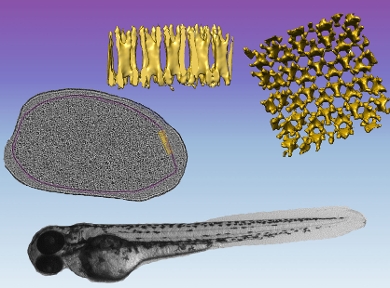
NWO grants two IBL-proposals by interdisciplinary research consortia
Recently, NWO has decided to grant two interdisciplinary research proposals for national and international consortia submitted by researchers from the Institute of Biology Leiden. One of the proposals is led by Prof. dr. Ariane Briegel, the other one by dr. Remko Offringa.
New insight cholera infection - Ariane Briegel
The structure of bacterial cells provides crucial clues about their interaction with their host. What are the key structural features of a bacterial cell that determine pathogenicity? What roles do these structures play in the life cycle, and how do they change during the infection process?

Dr. Ariane Briegel and partners will aim to answer these questions by determining the ultrastructural composition of Vibrio cholerae, the causative agent of Cholera. They will utilize the zebrafish as a model, a natural host with a human-like immune system. Using a multidisciplinary approach, they will combine advanced microscopy and novel chemical markers in order to get unprecedented insights into the biology of V. cholerae and its complex interplay with its host organism.
The research team will determine exactly when pathogens express specific cell attachment structures and signal transduction machinery and determine their role in infection. This work will provide a solid foundation to guide development of new and targeted treatments for cholera, which is urgently needed in view of the rise of antibiotic resistant pathogens.
The project will be carried out within the Netherlands Centre for Electron Nanoscopy (NeCEN), the Cell Observatory (Annemarie Meijer), Leiden University’s state-of-the-art core facilities, and the Institute of Chemistry (Sander van Kasteren). The Company partner is FEI.
Stress and Hormones Induce Test Tube Babies in Plants - Remko Offringa
The plant kingdom is characterized by a high level of developmental plasticity. In vitro cultured plant cells have, for example, the ability to form embryos from cells other than the fertilized egg. Such in vitro embryogenesis is induced in tissue culture by applying stress or plant hormones, and generates clones of the donor plant. This technique allows the asexual production of genetically uniform crop plants for breeding and propagation.
Dr. Remko Offringa and his colleagues from Wageningen University (Angenent and Boutilier, in vitro embryogenesis) and Utrecht University (Wennekes, bioactive small molecules) aim to understand where and how stress and hormone signaling pathways converge to promote in vitro embryogenesis. They will develop a common framework for stress- and hormone-induced embryogenesis by using different in vitro embryogenesis model systems as well as a combination of chemical biology and molecular genetic approaches.
The research is supported by a team of five companies specialised in crop breeding and tissue culture (KWS Saat, ENZA Zaden, Vilmorin & Cie, Iribov and Vegenov).

(a-c) Arabidopsis IZE explant after incubation on hormone-containing medium (a), individual somatic embryos (b) and fused embryonic structures (c). (d) Early embryogenic tissue marked by the pWOX2::NLS-YFP reporter.
